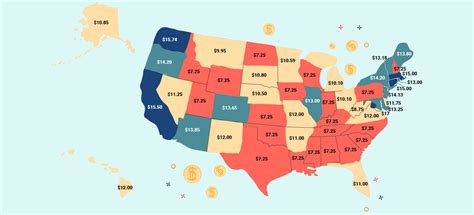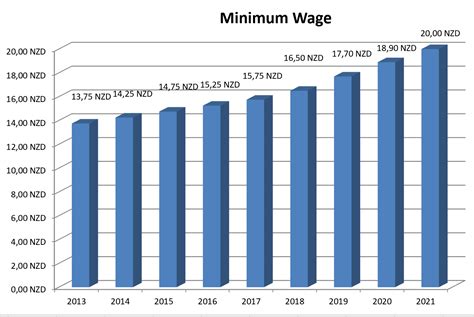Navigating Your Earnings in New Zealand: A Guide to the Minimum Wage and Beyond

Starting your career journey or entering the workforce in a new country can be both exciting and daunting. A fundamental question for any professional is, "What can I expect to earn?" In New Zealand, the government sets a legal minimum wage to ensure a fair baseline for all workers. As of 2024, this provides a solid starting point, but your true earning potential is determined by a wide range of factors.
This guide will break down the official minimum wage in New Zealand, explore the key elements that influence your salary, and provide a data-driven look at how you can move from a starting wage to a thriving career income.
What is the Minimum Wage in New Zealand?

Unlike a specific job role, the "minimum salary" or minimum wage in New Zealand is a legal pay floor established by the government. It represents the lowest hourly rate that an employer can legally pay its employees. The primary purpose of the minimum wage is to protect vulnerable workers from unfairly low pay and to provide a basic, livable income standard across the country.
Employment New Zealand, a part of the Ministry of Business, Innovation & Employment (MBIE), is the authoritative body that manages and sets these rates. It's important to understand that there isn't just one single minimum wage; the rate you are entitled to depends on your status. The system is divided into three main categories:
- Adult Minimum Wage: This is the standard rate that applies to all employees aged 16 and over who are not classified as starting-out workers or trainees.
- Starting-Out Minimum Wage: This lower rate applies to younger workers (16-19 years old) who are new to the workforce. Specific criteria apply, such as having been on a Jobseeker Support benefit for six months or more, or being in their first six months of employment with a new employer.
- Training Minimum Wage: This rate applies to employees aged 20 or over who are completing recognized industry training involving at least 60 credits a year.
Current Minimum Salary Rates in New Zealand

It is crucial to use the most up-to-date and official figures when discussing salary. In New Zealand, minimum wage rates are reviewed annually and any changes typically take effect on April 1st.
According to Employment New Zealand, the minimum wage rates effective from 1 April 2024 are:
| Wage Category | Per Hour | Per 40-Hour Week | Per Year (Approx.) |
| :--- | :--- | :--- | :--- |
| Adult | NZ$23.15 | NZ$926.00 | NZ$48,152 |
| Starting-Out | NZ$18.52 | NZ$740.80 | NZ$38,521 |
| Training | NZ$18.52 | NZ$740.80 | NZ$38,521 |
It is also important to note the Living Wage, which is distinct from the legal minimum wage. The Living Wage is an independently calculated hourly rate that a worker needs to earn to pay for life's necessities and participate as an active citizen in the community. As of 2024, the Living Wage Movement Aotearoa New Zealand has set this rate at NZ$26.00 per hour. While not legally mandated, over 400 accredited employers in New Zealand have committed to paying their staff at least the Living Wage.
Key Factors That Influence Your Salary

While the minimum wage provides a safety net, it is intended as a starting line, not a long-term destination. Several key factors will determine your ability to earn significantly more.
### Level of Education
Education is a powerful driver of earning potential. While many minimum wage jobs do not require a formal degree, acquiring qualifications is one of the most reliable paths to a higher salary. According to data from Stats NZ, individuals with a bachelor's degree or higher have a significantly higher median hourly income than those with no formal qualifications. For example, a certificate or diploma in a skilled trade like plumbing or electrical work can lead to earnings well over double the minimum wage. A university degree in a high-demand field like software engineering, finance, or healthcare provides a direct pathway to professional roles with high starting salaries.
### Years of Experience
Experience is arguably the most critical factor in salary growth. An entry-level employee in any field will naturally start at the lower end of that profession's pay scale. As you accumulate years of experience, develop your skills, and demonstrate a track record of success, your value to employers increases exponentially. A retail assistant with five years of experience who has been promoted to a store manager role will earn substantially more than a new hire. Salary aggregators like Payscale consistently show a strong positive correlation between years of experience and pay across all industries in New Zealand.
### Geographic Location
Where you live and work in New Zealand has a major impact on your earnings and expenses. Major metropolitan centers, particularly Auckland and Wellington, have higher average salaries but also a much higher cost of living. Because of this, many employers in these cities offer higher starting wages to attract and retain staff, often exceeding the legal minimum and aligning more closely with the Living Wage. Conversely, while salaries might be lower in smaller regional towns, the cost of housing and other essentials can also be significantly less.
### Company Type and Industry
The type of company and the industry you work in are huge determinants of pay. A small, local café may only be able to offer the minimum wage for a barista role. In contrast, a large national corporation or a multinational company often has standardized pay scales that start well above the minimum wage, even for entry-level positions. Furthermore, industries like Information Technology, Finance, Engineering, and Healthcare inherently pay more due to the specialized skills required. According to SEEK salary data, the highest paying industries in New Zealand consistently remain in sectors that require a high degree of specialization.
### Area of Specialization
General skills often command generalist pay. Developing a specialization is key to unlocking higher earnings. For example, within the IT sector, a general IT support person will earn a solid wage, but a specialist in cybersecurity or cloud architecture will command a premium salary. In the trades, a general labourer earns a base rate, but a certified welder or a licensed electrician with specialized diagnostic skills will earn significantly more. Focusing on in-demand niche skills makes you a more valuable and less replaceable asset.
Job Outlook

Discussion of a "job outlook" for minimum wage itself isn't applicable, as it is a pay rate, not a profession. However, the outlook for workers is shaped by economic policy and labour market trends. The New Zealand government reviews the minimum wage annually, and historically it has seen consistent increases to keep pace with inflation and the cost of living.
The more relevant outlook is for roles that typically start at or near minimum wage, such as those in hospitality, retail, and general labour. While there will always be demand for these roles, the key to career growth is leveraging them as a stepping stone. The focus for any professional should be on the outlook for skilled professions, which remains strong. For instance, the long-term outlook for jobs in technology, healthcare, and skilled trades in New Zealand is exceptionally positive, with projected growth and talent shortages driving salaries higher.
Conclusion

Understanding the minimum salary in New Zealand is the first step in planning your financial future. It provides a crucial safety net and a clear starting point for anyone entering the workforce.
Here are the key takeaways:
- Know the Numbers: As of April 2024, the Adult Minimum Wage is NZ$23.15 per hour.
- Minimum vs. Living Wage: Be aware of the Living Wage (NZ$26.00/hour) and seek out accredited employers who are committed to paying it.
- It's a Foundation, Not a Ceiling: The most important takeaway is that minimum wage is a starting point. Your long-term earning potential is not limited by this figure.
- Invest in Yourself: Your path to a higher salary is paved with education, hands-on experience, and developing specialized, in-demand skills.
By strategically planning your career, focusing on continuous learning, and positioning yourself in high-growth industries and locations, you can build a prosperous and rewarding professional life in New Zealand.
